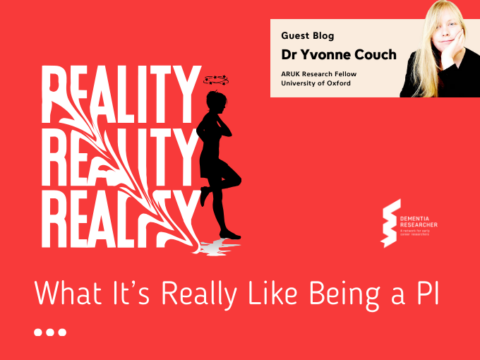Dementia research has been in the news again. Sadly, there is no promising new drug on the horizon, and no new breakthrough in our understanding of the brain diseases, like Alzheimer’s, which lead to dementia. Instead, we find ourselves shocked by an investigation into what has become a high-profile case of potential academic misconduct in our field. This case has been widely reported in the press, but what I haven’t seen so much is a focus on how early career researchers (ECRs) are affected by academic misconduct. In this blog, I will discuss how the structure of academia makes ECRs particularly vulnerable to the effects of academic misconduct.
I remember being an undergraduate student submitting my essays and reports with great trepidation that I might ever be guilty of plagiarism. Not through any desire to deceive in order to get good grades, but through my own ignorance of potentially not citing information correctly, or paraphrasing too closely to the source text. I had no idea how plagiarism software worked, so I was anxious that I would fall foul of it. Of course, like most students, I never did.
As I moved on to become a PhD student, I distinctly remember learning that academic misconduct was more than plagiarism. A case hit the news of a researcher allegedly faking data. At the time I just couldn’t believe anyone would have the audacity to do it, and the arrogance to think they could get away with it. I remember that in this specific case, the researcher had used an algorithm to generate data which fitted their hypothesis based on the experimental parameters they set out. The study drew the attention of other researchers in the field because the data was too perfect; it didn’t have the degree of variance which would be expected from that experimental design. This was around 10 years ago and it’s fair to say that things have improved with greater training on research integrity and a collective shift towards open science to allow more scrutiny. But have cases of academic misconduct just become more insidious?
Academic misconduct is often not as blatant as plagiarising work or fabricating data.
It also includes falsification which involves manipulating data to remove or change results, and p-hacking to change the data or statistical analyses to find a significant result. Both have the aim of giving misleading conclusions of studies and can be harder to detect, meaning most cases of academic misconduct go un-noticed.
When cases of academic misconduct come to light, it is clear that government or charity money has been wasted, and there can be a knock-on effect of wasted research in other labs that have been falsely led by that work. With the recent allegations, much of the discussion has been centred on this second point, and to what degree Alzheimer’s disease (AD) research over the last 15 years has been led down a rabbit hole due to the influence of that initial work on a particular type of amyloid oligomer in AD. I think Alzheimer’s Research UK provided a reasonable conclusion which emphasised how, although these allegations are significant, there is still a large body of unrelated research on the role of amyloid in AD, so this case doesn’t necessarily call into question the direction of AD research over the last 15 years.
So how does academic misconduct affect ECRs? In a previous blog I wrote about how the hierarchical structure of academia enables people to bully and harass others without reproach. Job security for junior members of staff is dependent on their Principal Investigator (PI), meaning they are unlikely to report bulling and harassment because of concerns it may create an even more challenging work environment, lead to a contract not being extended, or future job prospects being negatively affected, particularly if the PI is influential amongst peers in the field. These same factors apply to academic misconduct. ECRs are more aware than ever of open science practices such as open access publications, unrestricted data availability, study pre-registration, and registered reports. However, I have heard of many occasions where ECRs have been unable to engage in these practices due to objections from their PI. So ECRs face significant barriers in both promoting measures to help minimise potential for misconduct and reporting them when they arise. It is therefore not surprising that this research article published in 2020 found that power dynamics affect reporting of academic misconduct, with junior academics being less likely than those more senior to report potential misconduct. Reasons typically related to ‘fear of negative consequences’, ‘management’s willingness to take any corrective action’, ‘certain individual’s being protected’, and ‘fear of negative career effects’. As a result, it’s fair to say that most cases of academic misconduct are likely to remain unreported, but even when it is, the consequences are not perceived to be proportionate.
If academic institutions responsible for investigating potential misconduct by their staff fail to create an environment where staff, particularly ECRs, can report without fear of reproach, or worse, actively protect academics who are alleged to have engaged in misconduct, then their polices are nothing more than virtue signalling. But what is the alternative? This year, 10 committee members were appointed to the UK Committee on Research Integrity to promote good research practice in the UK. The hope is that they will address some of the issues around reporting of academic misconduct in UK Higher Education Institutions. However, when looking at who has been appointed to the committee, I remain sceptical. Of the 10 committee members, nine hold senior positions, with six being listed as full professors. As I mentioned previously, ECRs are more aware of open science practices, so it’s disappointing to only see one on a committee where promoting a strong culture of open science can help deconstruct the drivers of misconduct and lack of reporting, which is often tied to the hierarchical structure of academia.
ECRs are future PIs and lecturers, teaching the next generation of scientists about good research practice. They are future programme managers reforming what funders require of their grant holders. And they are also future reviewers and journal editors who can push for open science practices. ECRs are the future leaders so should be central in discussions around approaches to prevent academic misconduct.

Dr Kamar Ameen-Ali
Author
Dr Kamar Ameen-Ali is a Lecturer in Biomedical Science at Teesside University & Affiliate Researcher at Glasgow University. In addition to teaching, Kamar is exploring how neuroinflammation following traumatic brain injury contributes to the progression of neurodegenerative diseases that lead to dementia. Having first pursued a career as an NHS Psychologist, Kamar went back to University in Durham to look at rodent behavioural tasks to completed her PhD, and then worked as a regional Programme Manager for NC3Rs.

 Print This Post
Print This Post




